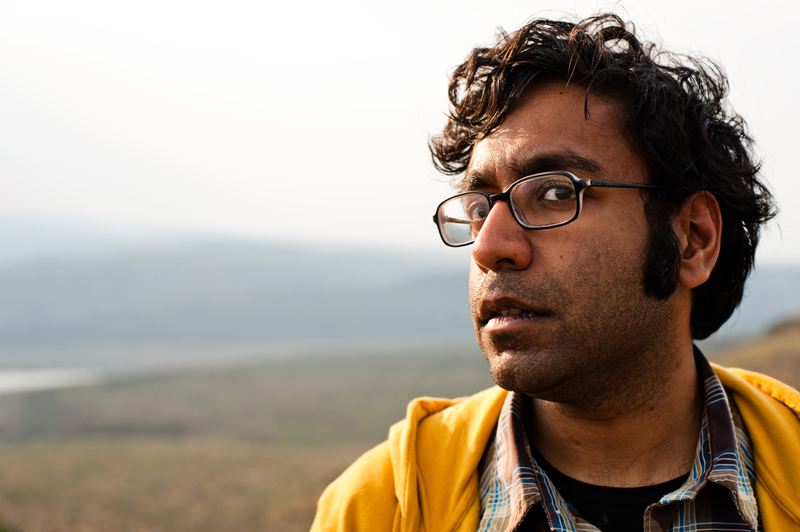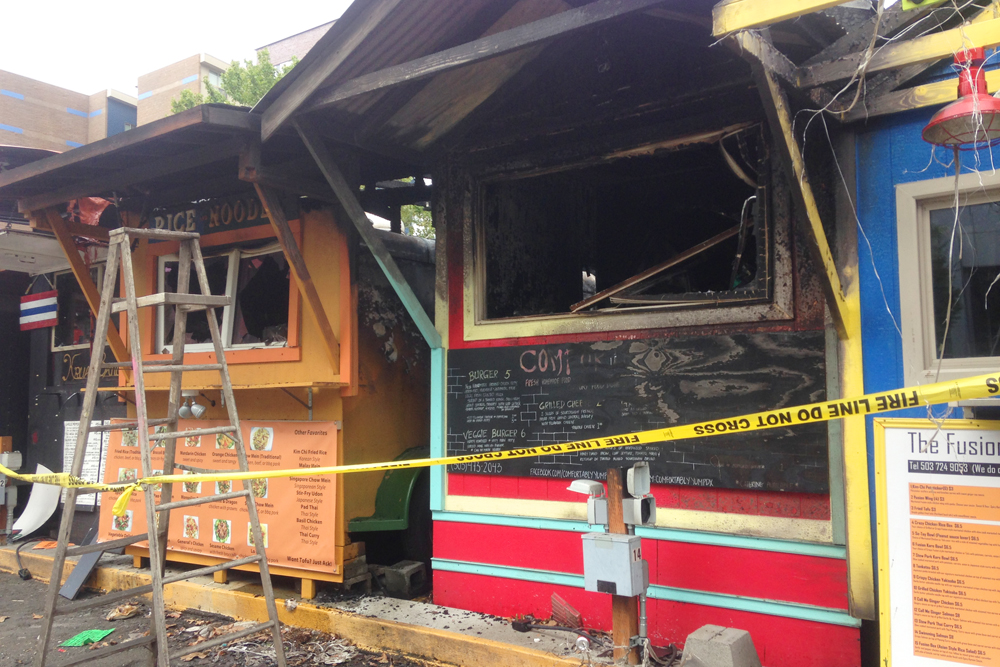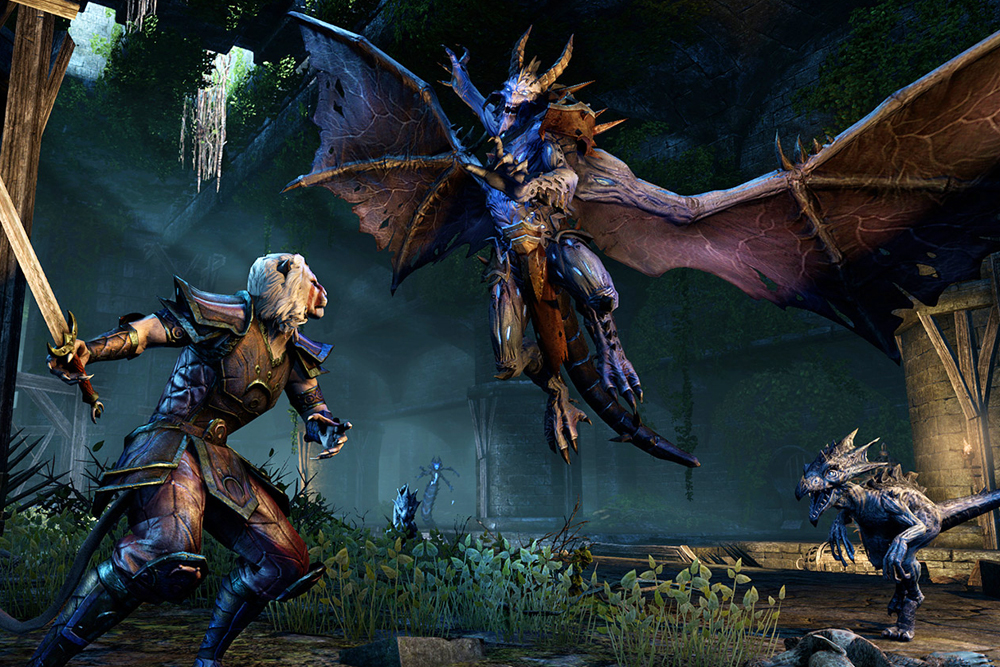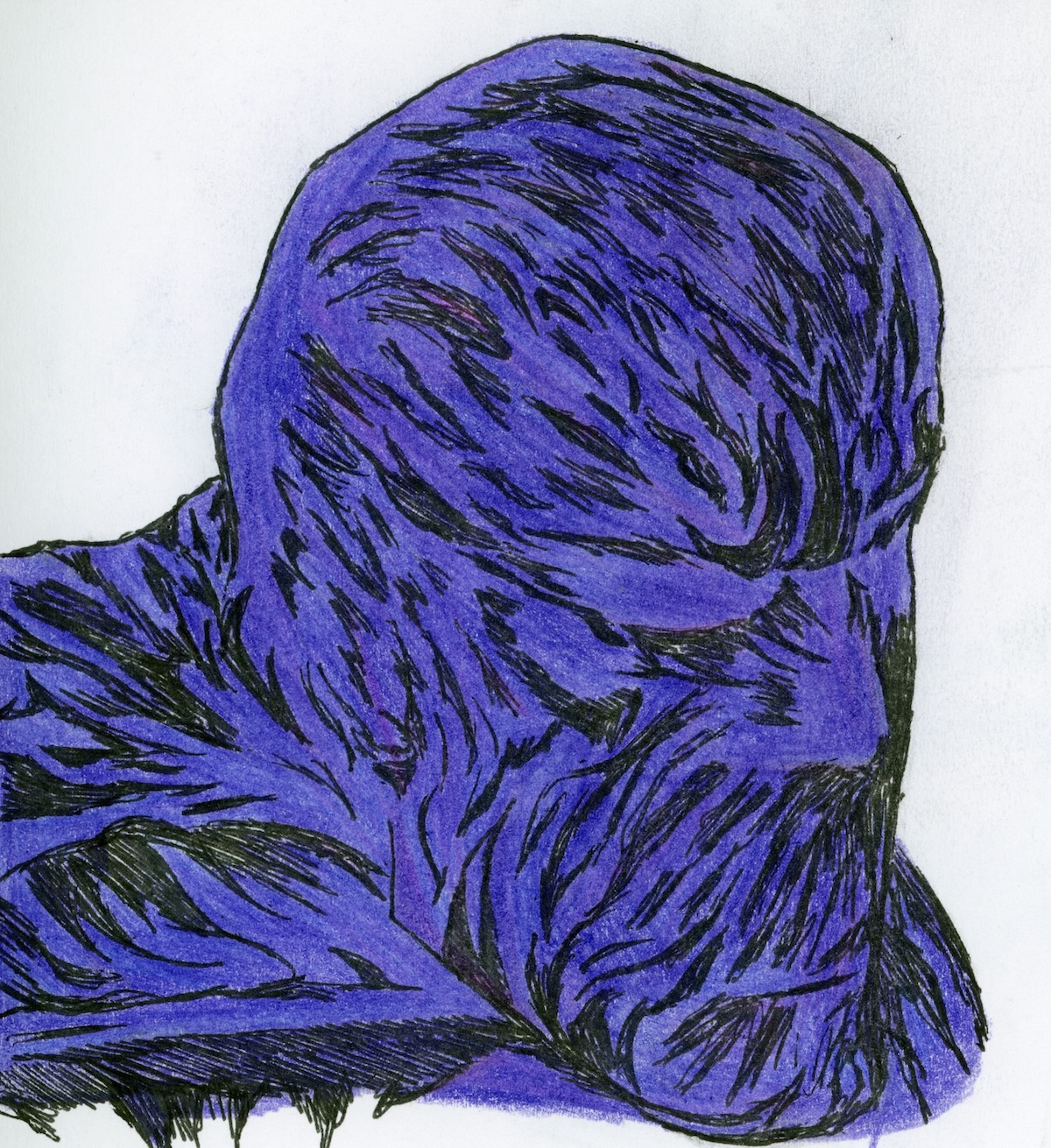Comedian Hari—sounds like “Hurry”—Kondabolu performs this weekend at Southeast Portland’s Helium Comedy Club. He kicked off his five-show run this evening, with four more performances between now and Saturday.
Brooklyn-based Kondabolu launched his stand-up career out of Seattle in 2005 while working as a human rights activist. His debut album “Waiting for 2042” was released in 2014 on Pacific Northwest–based independent label Kill Rock Stars.
Kondabolu tends to take on social issues and norms in his stand-up. He’s been touted by the New York Times as “one of the most exciting political comics in stand-up today,” though he doesn’t necessarily embrace this branding of his comedic style.
Colleen Leary: Your bio says you were discovered in Seattle when you were working as a human rights activist. What does that mean? Who discovered you and what were you doing?
Hari Kondabolu: I was an immigrant rights organizer for an organization that’s now called OneAmerica. They used to be called Hate Free Zone. We worked with victims of hate crimes—people dealing with immigration [issues], workplace discrimination cases—there were a bunch of different things we did at the time. The focus now more is on voting rights and policy, but back then we did a lot more direct service.
So I was doing that. I moved out to Seattle for that reason and did comedy at night. There was a really strong scene in Seattle at the time, and I loved stand-up. I did it in college. I did it a little bit in high school. Seattle offered me so much stage time, and that’s the fundamental part when you’re starting out as a comic.
So I just performed as much as I could. I got a spot on the Bumbershoot festival…and there was a man who worked at the HBO comedy festival. He liked what he saw, and he asked me to send him more stuff. So I sent some tapes in, and the next thing I knew, I had auditions for things. I’d never auditioned for a thing before.
It was pretty amazing to get discovered and eventually make the HBO Comedy Festival, Jimmy Kimmel Live and that kind of stuff.
So, I really felt like I was discovered. People don’t usually get discovered in the Northwest. You have to go to New York or LA.
CL: Right—you have to leave.
HK: You have to leave. You make as much noise as you can in the state you’re in. Then you go to the industry towns. Or you could get started somewhere like San Francisco or Chicago or Boston, which are big stand-up towns. I didn’t have to do that. It happened for me in Seattle. That’s why I have so much gratitude to Seattle.
CL: Since you started in the midst of your activist work, have you always in some form or fashion been labeled a political comic as people describe you now?
HK: Yeah. I’ve always kind of gotten that. I get it for branding purposes, but—and I’ve said this before—for me, political is personal. For what people call political comedy, for me is just observational.
Being able to see something very clearly—for me, it’s not like I’m putting on my political cap. It’s pretty straightforward to me. I can spot injustice pretty quick—whether it’s racism, sexism, oppression—I catch it really quick. But that’s not seen as observational, which is strange, because it’s fundamentally who I am.
I hate being called an activist comic or a social justice comic or whatever other label. I’m a mainstream comic. I talk about the things I talk about. I feel like whenever they say things like that, they miss the point.
Social justice and the ideas of equality and fairness, those should be mainstream ideas. Those aren’t things that I see as a niche. Those are things you want to have mainstream exposure.
It’s usually people who are trying to market me…that’s the purpose of that. But it does the work a disservice. It kind of casts me outside of my peers, which I don’t like.
I am a comic who performs mainstream clubs and on television. I do some things that are sort of not what comedians do. I have my work taught in curriculums. My album is on curriculums in colleges and high schools. That’s kind of a unique thing to me.
But at the same time, I’m just another comic in a green room. At a show with all the other comics, it’s not like I’m any different, you know? It’s funny to be kind of cast in this weird way that’s outside the mainstream when I think I’m just a mainstream comic.
CL: Sure, the nature of your material along with those labels create a sort of separation or make it sound like you have this grand mission or ulterior motive— maybe to be a voice for particular issues rather than a comic?
HK: Exactly. They feel like what I’m doing is something that is mission driven The goal is to make people laugh. If I cover all the topics I care about and nobody laughs, I’ve failed. This is about laughter. These are the kinds of things that I find funny, which is why I’m sharing it. That’s ultimately the goal.
I could do other things if my goal was to simply spread awareness or educate people. I could go back to school and get a PhD. There are other things I could have done with my skill set. I do this because I love to perform, and I do this because I love to make people laugh. That is my bottom line.
I get it, both for marketing and in terms of sharing this joke or performer you love with other people in a way they’ll understand it. But for me, it ultimately seems corny when you put a label on me. It alienates people who I think would enjoy the work, too. They might see those buzzwords and think they don’t relate to them.
CL: Given the social issues you tend to address, how does political correctness factor into your comedy?
HK: I never really understood what that meant. I’ve been called politically correct. But I don’t know. I have a bit where I call white people demons. I don’t know if that’s politically correct. It’s very bizarre that people always call me that.
I’m a sensitive person, and I’m thoughtful. A lot of the stuff I do tends to kick upward toward people who are in power or have control of some sort. A lot of what my heroes did in comedy is that kind of kicking upward and not going after people who—and this isn’t universal—but going after people that have a lesser position.
You’re not going to see me make jokes about homeless people. Or if there is a joke about homeless people, they’ll be empowered in the joke. That’s how I see that world. I don’t see that as politically correct. I see that as thoughtful, sensitive and just.
Even the word “offensive” is confusing to me. I think the whole idea of non-offensive and offensive material—it depends on who you are. To some people I am offensive. I’ve had enough people walk out of my shows to know that. For other people I’m speaking the truth that they’ve been waiting to hear. And some people are often on the fence.
There’s certainly stuff that puts people on edge and yet also makes them laugh and think. That’s really exciting. But that can be seen as offensive. It’s really confusing, and I think those words are often ways to dismiss people’s thoughts and opinions.
CL: There’s been a lot of discussion recently about the notion of censorship, and some comics and entertainers seem to feel threatened by the potential for being stifled or limited.
HK: No one’s really being censored in that sense. Here’s what it is: You say things now as opposed to before, and there are repercussions. People respond with articles or blogs or tweets. The thing is, that’s all art.
The internet is a double-edged sword. When you promote shows and put them out into the world…there’s going to be a response. We know this as comics, because the response we want is laughter.
We’re trying to manipulate the moment to create laughter. But you can’t assume that’s the only response you’re going to get. If you stand behind the work, and you really believe in what you’re doing, you have to respect that some people are not going to like it and move on from it.
I’ve been criticized. And, of course, like all comics I have an ego about it. But I’m still going to do what I’m going to do, or I’m going to change something, because maybe I thought the criticism was good. It depends. Sometimes I hear criticism that’s actually interesting. Most times I think its rubbish. It’s someone whose viewpoint I don’t agree with.
People are works in progress, and so is comedy. I think more than other art forms, stand-up is a very direct kind of art. It’s very immediate. From night to night you can change your opinions.
Sometimes people give Louis C.K. crap. They’re like, “oh, you said this on one special and that on another.” Yes. That’s called growth. I don’t understand how people expect consistency from others. People are inconsistent. People are not static. They change over time. They get new information. They evolve.
CL: A big difference today is, where comics have always gotten feedback, now there are all these forums where there’s direct access to comics or public figures of any nature that wasn’t there before. You know, there’s Twitter, there’s Facebook, etc. Oftentimes, the person you’re criticizing is the person who sees it.
HK: At the same time, it’s not necessarily direct access. You don’t need to read the comments. You don’t need to read the things that are tweeted at you. It’s really hard to resist it, but it’s still a choice. They’re not saying it to your face. There are no rallies in front of your house. This is still a choice.
We’re all really egotistical and sensitive people. Comedians sometimes are even more sensitive. That’s kind of why they see the world the way they do. They pick up on things. If you stand by your stuff, you’ve got to keep pushing forward.
I’m not one to say that you should never apologize. If you’ve done something and you regret the choice you made, why wouldn’t you apologize? If you don’t regret the choice you made and you disagree with criticism, then don’t apologize.
Whatever you do, whatever action you choose, I just hope it’s true to yourself. I’ve certainly done and said things I regret. And I’ve said things that don’t make people happy that I don’t regret. I also know that I tend to go toward what I find to be justice and truth.
But who’s to say I’m right? There are many different opinions. I’m just owning what I say.
CL: When you put a microphone in someone’s hand they’re bound to say something at some point that will spawn a heated reaction.
HK: Right. That’s the nature of live performance. It’s what makes people love and hate about stand-up. It’s the immediacy of it. It’s the danger of it. It’s how close you are to people or it’s the wall that’s constantly broken. That’s why it’s exciting. Or, for some people, it’s horrifyingly scary.
I think the idea of stand-up being a safe space—the public isn’t a safe space. There is no such thing. You can’t create safe spaces in the real world as easily. I don’t think stand-up is expected to be a safe space.
You can do research and find out who you like and…then you can savor and enjoy yourself more in certain places, potentially. But you can’t clearly telegraph what’s going to happen.
It’s true with all art, actually. You don’t know every scene in every movie. You don’t know what’s going to play out. You might hear things, but in films it’s sometimes even worse because they have even more attention drawn to them.
The difference is with comedy, you know who the culprit is. You see the person that’s causing you frustration. It’s not a major studio of executives and writers and editors and actors and directors, and all these other people that chose to make something fucked up. They don’t get the same level of all these different people who had a chance to stop an element of this movie and they all passed and said, “No, this rape scene is perfectly fine,” despite all those different safeguards.
But with a performer, you have one person talking, and that’s an easier target. People criticize whatever they want, and they’re warranted their opinions. But it also feels like an easier target to me. A person who, chances are, has less money. That’s not universal, but most comics are not rich. There’s so many of us, and we’re traveling around the country.
Going after somebody who has a video clip saying something you don’t like—you know their name, you know their website. It’s easier than going after some major production studio. It’s not to say that criticism isn’t warranted. I’m saying there’s a different power dynamic.
Kondabolu’s Portland appearances run through Saturday, July 25. Tickets start at $22 and are available here. He’ll also perform at Bumbershoot Festival 2015, Sept. 5–7.
For more from Kondabolu, visit harikondabolu.com or follow him on Twitter @harikondabolu.
Editor-in-cheese





